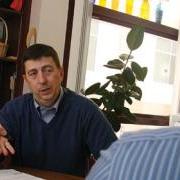|
The parking lots are nearly empty. The sidewalks sport a light blanket of freshly fallen snow. The classrooms are quiet and vacant. It certainly looks like activity has ground to a halt on this SUNY campus during intersession. But looks can be deceiving. In fact, professional members of UUP are hard at work keeping SUNY humming and making sure all is in readiness for the semester to come. “The campus just doesn’t roll up the sidewalks when the last class dismisses,” said Cobleskill’s Director of Residential Life Ed Asselin. “Campus housing is a year-round adventure.” Among the activities, at least one residence hall remains open to house international students, athletes and students employed at the campus. Training for student and professional staff is being finalized. Carpets are being shampooed and bathroom showers are being upgraded. Asselin takes part in a critical incident management exercise in his role as assistant vice president for student development and collegiate life. “This gives us a chance to assess our roles in a practice exercise—how we could respond to incidents like a water main break, a disease outbreak or a violent episode,” he explained. Another residence professional, UUPer Kimberly Harvey of Geneseo, finds she’s very busy during breaks. “I use the time that classes are not in session to review and reflect on the work I do as a student affairs practitioner,” said Harvey, Geneseo’s assistant director of residence life and coordinator of residential education. “This allows me to focus on planning ahead for the next academic semester and even academic year.” That planning involves talking with colleagues about future programs for students. During the summer, Harvey juggles planning with coordinating a three-week training session for residence life staff members. Calvin Gantt also is hard at work year-round at Geneseo. As the director for the Access Opportunity Program, he oversees a department that provides academic, social and emotional support to students who are the first in their family to go to college. Many of them have been in the U.S fewer than six years or are from underrepresented populations. Gantt works throughout the year to prepare for a summer program that acclimates the students to college. “We provide these students with a comprehensive experience that will allow them to be better prepared for college,” Gantt explains. During the winter break, Gantt and his department review more than 1,500 applications to the program and cull that pool to 100 students they admit. At Delhi, students learning to be veterinary assistants train in a building about a mile from the main campus that is filled with cattle, goats, chickens and pigs. They learn how to handle them, draw blood and conduct diagnostic testing. But Sarah Burkdorf, an instructional support technician who maintains the Large Animal Teaching Facility, and her staff are responsible for the care and feeding of the animals when the students are not on campus. “It is too hard to sell our animals and then go out and find animals to replace them,” Burkdorf said. “Not only are they safe to work with, but they’re also less likely to bring in disease if you have an established group.” Besides taking care of the animals when classes aren’t in session, Burkdorf works to “fine tune” the program, as well as budgeting and planning. At Delhi’s main campus, Assistant Director of Counseling Services Mary Wake tends to the mental health of students, including individual therapy, but that work doesn’t stop when students go home. “Our students on break and their parents often phone or e-mail needing assistance,” Wake said. “We also tend to the needs of prospective students and their parents who want to know if we’ll be able to treat their children when they’re here.” She also helps to plan and implement orientation for 1,000 new students, which takes place the weekend prior to the start of the fall semester. Wake said she gets a chance to re-evaluate the work her office performs while students are away. “It allows for uninterrupted access to my colleagues so that we can more effectively work together to tackle other important tasks like assessment and program changes,” Wake said. UUP professionals involved in records and technology realize their functions must be maintained and monitored year-round. Old Westbury Registrar Patricia Smith oversees the maintenance of the college’s student record systems, including grades, classroom and course scheduling, services that must be operated for the college to function. And how could any campus operate without computers? Technical Support Associate Josephine Motyl helps keep Cobleskill up-to-speed technologically. As a software support specialist who manages computer network accounts and services for employees. Motyl said some of her most important work is best performed when the campus is quiet. “Computer lab configurations and software installation is best done during breaks when interruption of network services is less obstructive,” she said. The dedication displayed by these UUP professionals is evident. But it’s more apparent by their response to the question of whether they feel frustrated having to work when many others get a break. Not one of them felt the least bit frustrated. Delhi’s Burkdorf summed up her feelings this way: “It comes with the territory. You can’t just turn the animals off. I am lucky to say that I love my job.” — Donald Feldstein |
Warning: count(): Parameter must be an array or an object that implements Countable in /home/uuphos5/public_html/voicearchive/wp-includes/class-wp-comment-query.php on line 405


